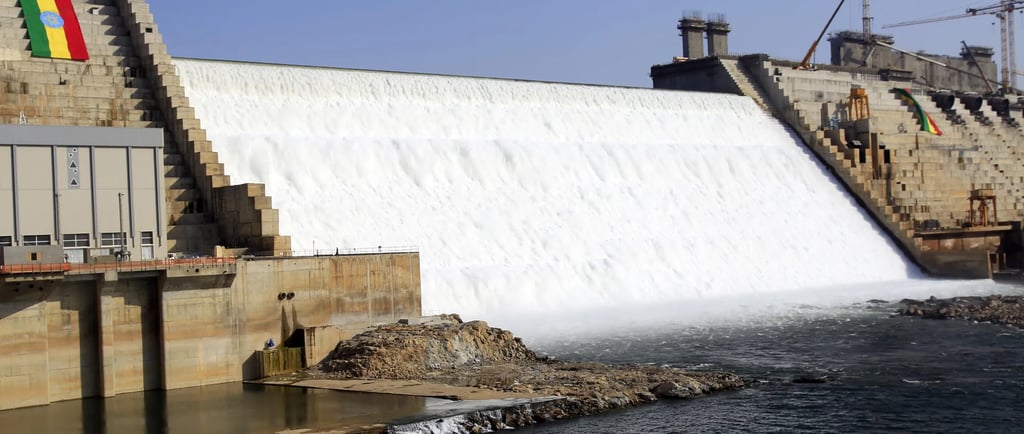Navigating the Nile: Egypt's Water Security Strategy in the Era of the GERD
By Mostafa Salah – Director, Shams Center for Strategic Consulting and Research
10/12/20253 min read


On September 9, 2025, Ethiopia switched on the Grand Ethiopian Renaissance Dam (GERD), a monumental project hailed as the "energy clock of Africa." For Ethiopia, it was a moment of national pride. But for Egypt, a nation whose very existence has been tied to the Nile for millennia, it was the dawn of a new and uncertain era.
The inauguration ceremony, attended by several African leaders but conspicuously boycotted by Egypt and Sudan, laid bare the deep divisions that have defined the GERD dispute. While Ethiopia’s prime minister offered assurances of “non-harm,” the absence of a legally binding agreement on how the dam will be operated—especially during droughts—has left Egypt facing an existential threat to its water security.
With the GERD now a reality, Egypt is being forced to adapt. This is the story of how a nation is navigating a turbulent geopolitical landscape and a looming water crisis, all while charting a new path for its future.
A Dual Crisis: At Home and Abroad
Egypt's challenge is twofold. At home, it is grappling with a severe and worsening water scarcity crisis. With a rapidly growing population, per capita water availability has already plummeted to less than 550 cubic meters annually, far below the international water poverty line. The GERD, with its massive 74 billion cubic meter reservoir, now gives Ethiopia the power to unilaterally withhold substantial volumes of water, a terrifying prospect for a country that relies on the Nile for over 95% of its freshwater.
Abroad, the crisis is unfolding in one of the world's most volatile regions. The Horn of Africa is beset by instability, the war in Sudan has created chaos on Egypt's southern border, and the Red Sea has become a flashpoint for international competition. In this turbulent environment, forging a fair and lasting settlement on the Nile has become more difficult than ever.
A Two-Front Strategy: Diplomacy and Domestic Resilience
Faced with this complex reality, Egypt has adopted a robust two-front strategy. It is fighting a determined diplomatic and legal battle on the international stage while simultaneously pursuing an ambitious domestic agenda to build resilience from within.
The External Front: A Diplomatic Full-Court Press
Following the GERD's inauguration, Egypt immediately took its case to the UN Security Council, condemning Ethiopia's unilateral actions as a violation of international law. Cairo’s message was clear: it will not recognize the dam's unilateral operation and reserves the right to defend its vital interests.
The strategy is to mobilize global support and raise the diplomatic cost of Ethiopia’s non-compliance. Egypt is building a robust legal case and plans to launch an advocacy campaign at major international forums like COP30 to rally public opinion against any future unilateral dam projects. This is no longer just a dispute over a dam; it is a fight to defend the principles of international water law.
The Domestic Front: Engineering a Water-Secure Future
Recognizing that diplomacy alone may not be enough, Egypt is pursuing a sweeping national plan to secure its water future. This is not about accepting a new, diminished reality, but about preparing for it. The strategy is built on two pillars:
1. Expanding Water Supply:
Seawater Desalination: Egypt has launched a massive, multi-billion-dollar plan to build a network of desalination plants along its coastlines. Powered by renewable energy, these facilities will transform seawater into fresh water, easing the immense pressure on the Nile.
Wastewater Reuse: The country is now home to some of the world's largest wastewater treatment and reuse projects, like the Bahr El-Baqar plant. This "new water" is being used to support massive agricultural projects, turning desert into farmland.
2. Maximizing Efficiency:
Modernizing Irrigation: A nationwide project is underway to line thousands of kilometers of irrigation canals, reducing water loss and ensuring more efficient delivery to farms.
Promoting Smart Agriculture: The government is encouraging the adoption of modern irrigation techniques likedrip and sprinkler systems, which can boost crop yields while using significantly less water.
Legislative Reform: A new water law imposes stricter penalties for waste and strengthens community-led water management.
The Looming Threat of Drought
The most critical unresolved issue remains the threat of a prolonged, multi-year drought. Without a binding agreement on how the GERD and Egypt’s High Aswan Dam will be operated in coordination, the risk of a catastrophic water shortage is dangerously high. Ethiopia’s unilateral control over the Blue Nile's flow effectively blinds Egypt, making it impossible to prepare for a drought.
This is why a legally binding agreement is not just a diplomatic preference; it is an absolute necessity for regional stability.
Conclusion: A New Nile Reality
The inauguration of the GERD has undeniably shifted the balance of power on the Nile. Egypt can no longer exercise the same level of control over the river's waters as it did in the past. Its future will be defined by its ability to adapt, innovate, and build diplomatic coalitions that protect its interests.
Ultimately, Egypt's success in navigating this new era will not be measured by military might, but by its political, economic, and environmental resilience in the face of a challenge that strikes at the very heart of its national identity.
Download the full study here.
Empowerment
Amplifying African voices for sustainable progress together.
Contact US
Growth
Street No. 3281, N'Djamena, Republic of Chad.
© 2024. All rights reserved.